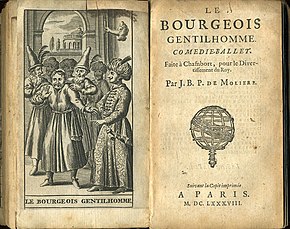We don't know exactly when the French playwright Moliere was born, but he was baptized on the 15th of January, 1622.
Of course, Moliere was his stage name, so he was baptized Jean-Baptiste Poquelin, not Moliere. In honor of the anniversary of his baptismal day today, I read his play Le Bourgeois gentilhomme, which is generally translated as The Bourgeois Gentleman.
The play premiered in 1670, at which point Moliere was already famous for writing The Blunderer, Sganarelle, and The School for Wives, and infamous for writing Tartuffe, Don Juan, and a scandalous adaptation of Amphitryon. This time, however, he would flatter the court of Louis XIV and make fun of the rising middle class.
Moliere himself played the titular character, Monsieur Jourdain, who is merely bourgeois, but has pretensions of being a gentleman. He receives lessons from a music master, a dancing master, a fencing master, and a philosophy master. Though Moliere was a magnificent poet, the play is mostly written in prose. This leads to a comic moment, when Jourdain famously exclaims: "On my conscience, I have spoken prose above these forty years, without knowing anything of the matter...."
Armande Bejart, who was married to Moliere, played Jourdain's daughter Lucile. As often happens in Moliere's plays, the protagonist's daughter is in love with one man, but he wants to marry her off to someone else. In this case, the social climbing Jourdain fixates on the idea of marrying his daughter to a son of the Ottoman Emperor. The year before, an Ottoman ambassador had refused to bow before the king, creating quite a scandal, so the play's aristocratic audiences probably enjoyed the idea of making fun of the Turks as well.
In the play, Lucile's lover dresses up as a Turk and pretends to be the son of the Ottoman Emperor. There's a lot of goofy fake Turkish, as he and his servant fool Jourdain into thinking that they're actually from the court of the Ottomans. The plan works, and all ends happily.
The composer Jean-Baptiste Lully composed music for the piece. The score survives, and what I've heard of it sounds fun. I'd love to see a production someday using the original music!
